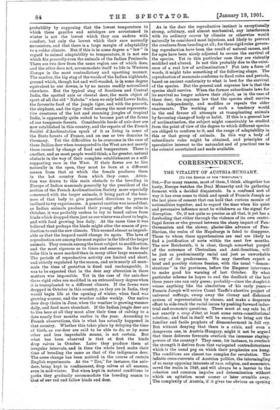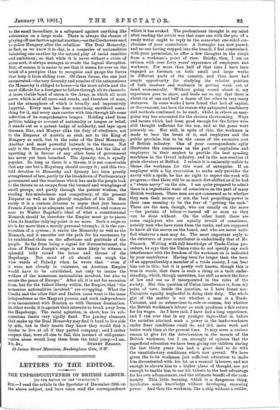CORRESPONDENCE.
THE VITALITY OF AUSTRIA-HUNGARY.
[To THE EDITOR OF THE "SPE0TAT0R.1 Snt,—For many reasons, most of them, I think, altogether too hasty, Europe watches the Dual Monarchy and its gathering ferment with a decided disquietude. In a confused sort of way it has even come to think and speak of Francis Joseph as the last piece of cement that can hold that curious mosaics of nationalities together, and to regard the time when his quiet . and persuasive influence must be withdrawn as the signal for disruption. Or, if not quite so precise as all that, it yet has a foreboding that either through the violence of its own centri- fugal forces or else ground between the sharp impact of Germanism and the slower,- glacier-like advance - of Pan- Slavism, the realm of the Hapsburgs is fated to disappear. Those to whom these apprehensions are real are likely to find a justification of sorts within the next few months. The new Reichsrath, it is clear, though somewhat purged of the extremes of Clericalism and Anti-Semitism, -will be just as predominantly racial and just as unworkable as any of its predecessors. We may therefore expect a brief and possibly riotous Session, with the usual " demon- strations " in the provinces, before the Emperor intervenes to make good his warning of last - October. By what particular scheme he hopes to end the deadlock of the- last three years one can only guess; probably—since the Ausgleich vetoes anything like the absolutism of -his early years— Francis Joseph will revive Count Taaffe's -abortive project of . universal suffrage, sweep away the clumsy and dishenest system of representation by classes, and make a- desperate effort to side-track the racial issues by pushing forward indus- trial and economic questions. There must at any rate be, if not exactly a coup d'itat, at least some extra-constitutional solution; and that in itself will be enough -to bring out the familiar and facile prophets of- dismemberment in fill cry. But without denying that there is' a crisis, and. even- a dangerous one, in Austria-Hungary, might it not be argued that these dolorous forecasts overlook 'the immense. staying powers of the country ? They seem, for instance, to overlook the strength it derives from that variegated contradictoriness which is the usual' peg on which their prophecies are hung. The conditions are almost too complex for revolution. The infinite cross-currents of Austrian politics, the intermingling of so many opposing interests of race, religion, and economics, saved the realm in 1848, and will always be a barrier to the cohesion and common impulse and determination without which an agitation must sooner or later crumble away. The complexity of Austria, if it gives too obvious an opening . to the small incendiary, is a safeguard against anything like subversion on a large scale. There is always the chance of playing off one faction against another,—as the Czechs were used to police Hungary.after the rebellion. The Dual Monarchy, in fact, as we know it to-day, ie a congeries of nationalities balancing one another by the natural play of racial enmities and"ambitions ; so that while it is never without a crisis of some sort, it always manages to evade the logical disruption. But, of course, it is easier to see that it seems for ever on the brink of a precipice than to recognise and gauge the forces that keep it from sliding over. Of these forces, the one just enumerated—the very diversity and number of the antagonisms the Monarchy is obliged to house—is the most subtle and the most difficult for a foreigner to follow through all its channels. A more visible bond of union is the Army, in which all must serve, which is of all races and creeds, and therefore of none, and the atmosphere of which is broadly and impressively Imperial. Every man has done something, sacrificed some- thing for it, and every man carries with him through life some reflection of its comprehensive temper. Holding aloof from politics, taking no account of nationality or tongue or belief, it stands out as a patent badge of solidarity, and lays upon German, Slav, and Megyar alike the duty of obedience, not to the Emperor of Austria as such, nor to the King of Hungary as such, but to the ruler of the Dual Monarchy. Another and most powerful bulwark is the throne. Not only is the Monarchy accepted everywhere, but the idea of upsetting it in favour of any other form of government has never yet been broached. The dynasty, too, is equally popular. So long as there is a throne, it is not conceivable that any one but a Hapsburg should occupy it ; and this two- fold devotion to Monarchy and dynasty has been greatly strengthened of late, partly by the breakdown of Parliamentary government and the weariness which has made the people look to the throne as an escape from the turmoil and wranglings of small groups, and partly through the patient wisdom, the sterling fair-mindedness and competency, of the present Emperor as well as the ghastly tragedies of his life. But surely it is a curious delusion to argue that just because Francis Joseph is so adequate and well-beloved, and comes so near to Walter Bagehot's ideal of what a constitutional Monarch should be, therefore the Empire must go to pieces when its familiar rallying-point is no more. Such a reign as his is far more than a merely personal triumph ; it is the con- secration of a system; it exalts the Monarchy as well as the Monarch, and it smooths out the path for his successors by its established claim on the affections and gratitude of the people. So far from being a signal for dismemberment, the close of Francis Joseph's reign is more likely to witness a splendid rally round the house and throne of the Hapsburgs. But most of all should one weigh the wise words of Palacky when he wrote that "even if it were not already in existence, an Austrian Empire would have to be established, not only to insure the welfare of the numerous nationalities involved, but also to secure the peace of Europe." After all, it is not for secession from, but for the fullest liberty within, the Empire, that "the numerous nationalities involved" are struggling. What the Czechs and the other Slav and Italian races want is the same independence as the Magyars possess, and such independence is as inconsistent with Russian as with German domination. In other words, it is against their interests to break away from the Hapsburgs. The racial agitation, in short, has its sub- conscious limits very, rigidly fixed. The jarring elements that make up the Dual Monarchy may find it hard to live side by side, bat in their hearts they know they would find it harder to live at all if they parted company ; and I rather suspect that, were all else to fail, this instinct of self-preser- vation alon,e would keep them from the fatal jump.—I am,







































 Previous page
Previous page